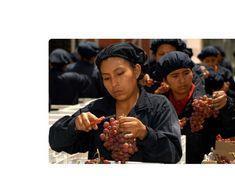
A young Peruvian company is leading the country’s charge out of wine production and into table grapes.
Eichler Corp Group (ECO), a group of growers, has only been operating for six years. Its 800 hectares of farms are located in the fertile Ica Valley, 300 kilometres south of Lima in the Peruvian coastal region, and 500ha are used to produce grapes and asparagus.
ECO was one of the first companies in Peru to grow table grapes, says vice president of marketing and sales, Henry Eichler. “Peru has a long history of growing grapes for wine production and we thought we would recognise this history and introduce table grape production to supply supermarkets.”
The Ica Valley has a rich agricultural landscape, bound by desert, mountains and sea, and with ideal soil and weather conditions to grow grapes. “The region has no rainfall,” says Eichler, “and if it does, then it is light. The water supply from The Andes is very good and we use drip irrigation from wells.”
The initial varieties chosen for planting - Red Globe, a white seedless strain and Flame Seedless - were bought from Chilean nurseries. “We learnt to grow the varieties with some technical help from Chilean and Israeli specialists. But there has also been a shift in local agricultural knowledge for table grape production, so there is definitely developments being pushed by the internal market.”
Eichler is content with the current grape yields - Red Globe, 300,000 boxes, Flame Seedless, 150,000 boxes and white seedless, 150,000 boxes. ECO promotes and exports its produce from its Miami-based marketing company, Agricorp USA, to facilitate logistics management and to allow better contact with customers. Eichler says: “We are now producing good quality grapes and export 95 per cent of production. The quality of the grapes now competes with South African fruit, which is the benchmark for us.
“We are slowly carving out a niche market. The seedless varieties are popular in the UK, US, Canada and Europe [it supplies the Dutch supermarket Albert Heijn]. The south east Asian markets however, prefer the seeded Red Globe variety, which we also send to South America, the US and Canada. There is a small demand for Red Globe in the UK during certain festivities, such as Chinese New Year, but although it is catching on, it is limited. Grapes that don’t meet foreign supermarket standards are sold in the local market or neighbouring countries.”
In the UK, ECO supplies Tesco through Richard Hochfeld Group and Sainsbury’s through Grapes Direct. Previously it supplied Asda but with the retailer’s shift in category management, says Eichler, this is not currently the case. “We are happy with the relationships we have developed with our UK importers - communication is important. We feed information to them pre-season about timing, quality and volumes and they give us feedback about other grape markets we are in competition with. These relationships have been built up and we now have a place in the UK market which we want to maintain in the long term.”
Peruvian grapes arrive in the UK at the end of October and usually command good prices. Eichler says: “Our grapes are available during the Christmas rush period and at this time, the seasons in Chile and South Africa are not yet in full swing.
“So far, pricing has not been an issue for us and our grapes have priced well because of the lack of competition at the beginning of our season.” Flame Seedless begins at the end of October through to December, white seedless runs from early November until December while Red Globe is harvested from the beginning of December until January.
ECO is proactive in its marketing and linearly monitors their export programmes, such as sales activities in the US versus the UK, and exchange rate fluctuations. “By analysing market opportunities we have been able to sell into short markets - this season we sold white seedless into California,” says Eichler.
“Sixty per cent of our grapes are programmed but we like to have flexibility too. When the South African season begins, we see a shift in supply/demand and by having the flexibility, it works well with managing our shipments.”
Eichler has clear plans for the future: “We want to continue to maintain the quality we have achieved with the three varieties, but also add new varieties to our offer. We want to develop our packaging and aim to add value to our produce that can be passed on to the consumer,” he says.
“One idea to develop is packaging grapes in punnets - we are evaluating the benefits of pre-packing the punnets in Peru rather than in Europe. The punnet is relatively new to our industry and exciting as packing grapes this way has its advantages; the grapes are protected with less shatter or fallen berries; and smaller bunches can be supplemented, opening up more fruit to the programmes. The punnets present well to consumers and store well, helping to extend the fruit’s shelf life. It is more expensive and freight costs are slightly more, but any problems are isolated and easier to solve.
“ECO is committed to surpassing customer expectations and we are always looking for new ways to grow, harvest, pack and add value to our growing produce range. We plan to develop new markets and strategies to promote our quality grapes and analyse windows of opportunity that exist for Peruvian produce,” adds Eichler.






No comments yet